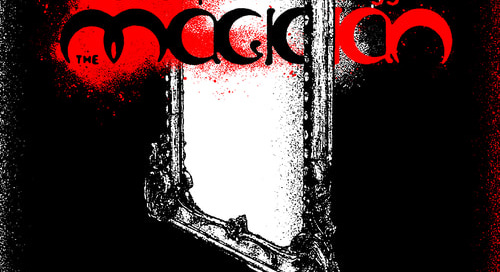Sordid Spiritual
Eric Paris Whitfield reviews Christopher Zeischegg's THE MAGICIAN.
When I received The Magician, sent to me by my friend and writing director at Empowerment Avenue, I hadn’t heard of Christopher Zeischegg (“C.V.”), or his novel. I set the book on my correctional facility prisoner-issued locker, next to the other fiction and nonfiction books I have not quite gotten around to reading, including the pristine King James Bible my mom sent to me about 23 years ago.
The Magician’s pages are saturated with sex and sex work, bloodletting, addiction, violence, voyeurism, masturbation, and religion, including ritualistic pagan practice. Every page takes the reader down its own rabbit hole, as if you were in a confessional, or listening in on one.
I am not a devout Catholic, or anything like it. But, once I began reading, I did find myself giving The Magician and the Bible a wider breadth from one another on the locker. It felt appropriate to do so.
Sure, the book has plenty of raunchy and sadistic scenes. But beyond those themes, at the core of The Magician, lies codependency. Codependency intersecting with sexual exploitation, violence, substance abuse, and C.V.’s struggle with them, as well as his faith in God.
In The Magician, the Christian characters and Raven, who purposely calls on demons to do her bidding, both demonstrate their reliance on powers inside themselves which come from outside themselves, which is fundamentally what defines a possession (from my memories of The Exorcist, anyway).
Although this book explores C.V.’s complicated relationship with Christianity, and certainly also with God, the dark magic aspect reveals a polemic shift in the characters representing either Christianity or the dark arts. Sexual exploitation and violence are equally demonstrated by characters who approach both aspects of the supernatural; yet, so is kindness.
Sexual exploitation and violence are equally demonstrated by characters who approach both aspects of the supernatural; yet, so is kindness.
C.V.’s identity is shaped by validation-seeking, people-pleasing self-centeredness, but in a way that appears altruistic, understanding love as chaos, self-defining it as passion. The Magician delves into how codependency is not exclusively played out in addiction, but is a part of many, if not all, transactional relationships. If you ever struggled with substance abuse personally (I have) or loved someone who has (which I have too): we have been waiting for this book!
What I can now look back on, having once struggled with my own codependency: there was little to no accountability, or a sense of being anchored in community. This subtle detail speaks to how C.V. is pulled into many of the sexually traumatic and violent incidents he endures throughout The Magician. In a way, C.V. makes the reader his codefendant, because we pull for him, we feel his pain, as we watch for his next train wreck, as we remember our own.
Christopher Zeischegg, intentionally or not, demonstrates codependency, which is usually feminized in characters, through his protagonist, who is male, white, and Christian, but bisexual. In a way, he mocks patriarchal ideas for what it means to be a white male. As C.V.’s codependency grows in his relationships—with Andrea, Phil, Raven, his mom and stepdad—C.V.’s identity morphs into whatever it needs to be to maintain the illusion.
I wonder if Christopher, the author’s, own blood is on these pages. The language, the tone, the feeling of what is being conveyed so fully, it can’t be from imagination or research alone, can it? And, I am confounded by the idea that addiction or codependency can both appear as bodily possessions. Whether this is a point C.V. deliberately is making or not, an argument can be made.
This book is smart—careful not to sensationalize, romanticize, or victimize those who can read themselves, or others, on pages of The Magician. You’ll laugh, cry, get scared, even angry, but these 69 chapters read like a movie, one where the characters remain with you well after its over.
One must check their puritanical sexual shame and gender dogmas at the door when reading The Magician. The art on the cover does not adequately encase the lessons this book has to offer. I’ll spare you the clichéd adage about book covers. Just know, Zeischegg’s words are the masterpiece.
But I will leave you with this: If you are looking for a book that explores the incredibly bewildering and complicated mess that codependency makes of relationships, The Magician is a must read, at least twice.






Im definitely looking forward to this one!